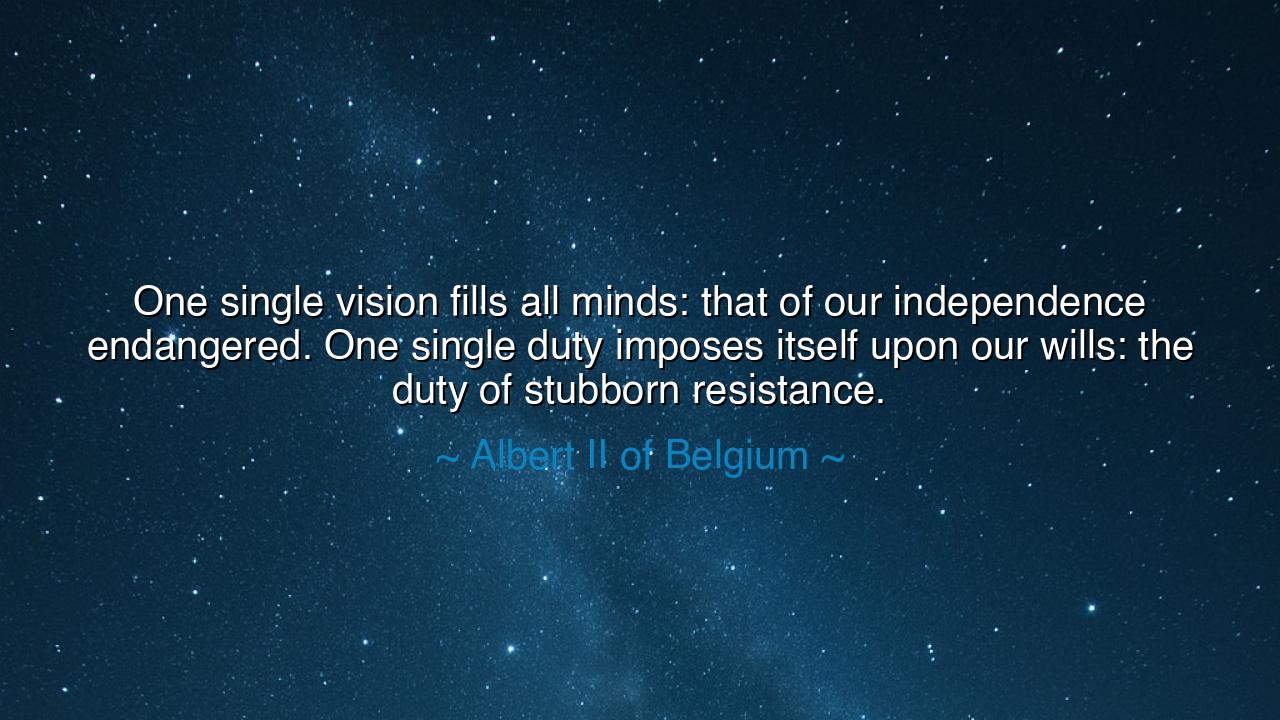
One single vision fills all minds: that of our independence
One single vision fills all minds: that of our independence endangered. One single duty imposes itself upon our wills: the duty of stubborn resistance.






Hear now the words of Albert II of Belgium, spoken with the gravity of a sovereign and the heart of a father to his people: “One single vision fills all minds: that of our independence endangered. One single duty imposes itself upon our wills: the duty of stubborn resistance.” These words, born of peril and patriotism, rise like a clarion call from the soul of a nation. They speak not merely of Belgium’s hour of trial, but of the eternal struggle faced by all peoples when freedom trembles before the shadow of conquest. In them, we hear the timeless song of defiance — that though walls may fall and armies scatter, the spirit of a people, once awakened, cannot be subdued.
The origin of this quote lies in the deep and storied history of Belgium, a small nation often caught in the storms of greater powers. It was in moments of danger — during the dark clouds of invasion and war — that King Albert II evoked these words to remind his people of their shared destiny. Belgium, standing at the crossroads of Europe, has long known what it means to defend its independence against mightier neighbors. In his declaration, Albert II did not merely speak of political sovereignty, but of moral unity — the unbreakable bond that ties citizens together when freedom is threatened. His words carry the echo of his forebear, King Albert I, who, during the Great War, refused to surrender and led his army in defense of Belgian soil, declaring that honor, not survival, was the true measure of a nation’s worth.
When Albert II proclaimed that “one single vision fills all minds,” he summoned his people to clarity. In times of peace, a nation may quarrel, divided by class, creed, or ambition. But in times of danger, these divisions must dissolve before the greater truth — that a people’s liberty is the root of all their differences and the shield that protects them. Independence is not the privilege of governments; it is the heartbeat of the people. Without it, no art, no faith, no love of homeland can endure. Thus, the king’s words transform the fear of peril into a unifying flame, binding every citizen to a shared purpose: resistance.
The duty of stubborn resistance, as Albert called it, is not born of hatred but of love — love for home, for heritage, for the simple dignity of self-rule. The ancients understood this. When Leonidas of Sparta stood at Thermopylae, he knew the Persians would crush his small band of warriors. Yet he resisted, not in hope of victory, but in fidelity to freedom. So too did Albert’s Belgium stand against overwhelming foes, holding fast not because success was certain, but because surrender was unthinkable. To resist stubbornly is to say: “You may take our land, but you shall never command our will.” That is the essence of independence — the freedom of spirit even when the body is bound.
Yet these words speak beyond the field of battle. They speak to the storms within the human soul. Each of us, in our lives, faces moments when our independence — our integrity, our moral freedom — is endangered. The pressures of conformity, corruption, and despair wage war upon the individual as surely as empires do upon nations. In such moments, Albert’s wisdom becomes personal: we must resist — not with violence, but with steadfastness, with truth, with courage. The stubborn resistance he calls for is the endurance of conscience, the refusal to betray one’s values even when the world demands it.
The history of Belgium offers many such examples of valor. When the Nazi armies swept across Europe in 1940, Belgian citizens — soldiers, farmers, and even children — rose in defiance. Some took up arms in the Resistance, others sheltered the persecuted, risking their lives for strangers. They had little hope of victory, yet they understood that to resist was itself a victory of the spirit. They lived Albert’s command: to meet oppression not with despair, but with dignity. For even if freedom seems lost for a time, the act of defiance plants the seed of its return.
And so, O listener, take this teaching as both warning and inspiration. The vision of independence endangered comes to all who cherish what is good — for every blessing invites envy, and every virtue invites trial. But when that trial comes, let your heart remember the duty of resistance. Stand firm in your principles, even when they cost you. Protect the freedom of your soul as fiercely as a people guards its homeland. For liberty — whether of nation or spirit — is not given; it is defended, day by day, by those who refuse to bow.
Thus, let the words of Albert II of Belgium endure as a watchfire for the generations: that in the face of danger, unity is our vision, and resistance our duty. Let no threat, no hardship, no fear make us yield what is sacred. For though kingdoms may rise and fall, the spirit that resists injustice endures forever — unbroken, unbending, and free.






AAdministratorAdministrator
Welcome, honored guests. Please leave a comment, we will respond soon